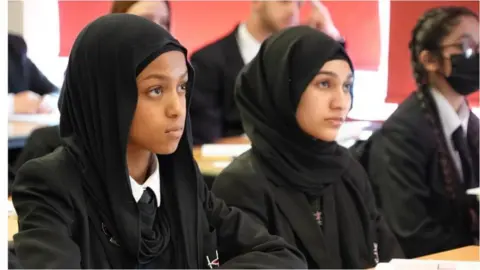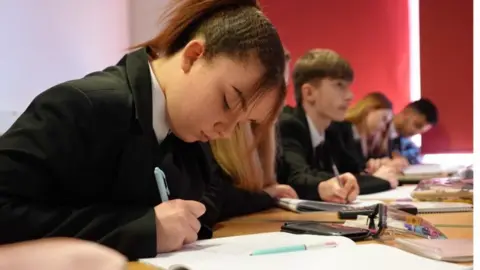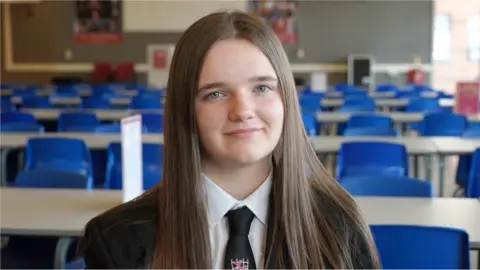Schools White Paper includes higher maths and English targets
 BBC
BBCHigher English and maths targets and the introduction of a national behaviour survey are among new plans for schools in England.
By 2030, ministers want 90% of children leaving primary school to reach the expected standards in reading, writing and maths. In 2019, the figure was 65%.
At GCSE, the government wants the mean average of all grades to rise from 4.5 to 5 - a "strong pass".
Research suggests teenagers' reading skills have fallen further this year.
The amount of learning lost because of the pandemic varies significantly across England and the poorest pupils have fallen further behind than the better off, according to a report for the government by the Education Policy Institute (EPI) and Renaissance.
In the autumn term, secondary pupils in the North East, North West and Yorkshire and Humber were, on average, three months behind the level they might previously achieved, it found.
Unions and charities say the plans laid out by the government could fail to help the poorest pupils.
The new English and maths targets are for the whole of England, rather than for each individual schools.
The ambition includes pupils identified as having a Special Educational Need or Disability (SEND).
Education Secretary Nadhim Zahawi told the BBC that any pupil falling behind in maths or English would receive help.
"It's not about more pressure on the children. It's about more support," Mr Zahawi said.
"If a child has fallen behind, the teacher will support that child, and engage with the parents to explain to them exactly what support they are putting in."
Mr Zahawi said the government would fulfil its promise of offering six million tutoring courses by 2024 to help pupils catch up, using the National Tutoring Programme.

The government's White Paper includes plans for an annual national behaviour survey of parents, children and teachers.
Parents and teaching staff were asked for their views on behaviour, in a government review, last year.
And in an effort to drive up attendance after the pandemic, the government wants to make it the local authority's legal duty to re-engage pupils missing most of their lessons.
Mr Zahawi told BBC One's Sunday Morning programme "around 200,000" children were currently off school because of coronavirus, following two years of disruption caused by lockdowns and classroom closures.
'Not well funded enough'
But EPI chief executive Natalie Perera said it was unlikely the government's pledges would be met.
"Our analysis shows that the government's catch-up programme is not well funded enough to make good these learning losses, and get the disadvantage gap closing again," she said.
The EPI's research suggests learning losses for primary pupils showed signs of recovery in the autumn term, compared with the 2020-21 summer term.
But there have been further losses among secondary pupils.
The government has committed £5bn to education recovery in England - about a third of the sum recommended by Sir Kevan Collins, who, in protest, resigned as the prime minister's adviser.
Asked about the funding, on the BBC One's Breakfast programme, on Monday, Mr Zahawi said the government was "doing well" in primary-school recovery in reading, writing and maths and needed "to do the same" in secondary schools.
He said he would measure recovery and publish progress, adding: "If I need more money, I will go back to the Treasury and say we need to go further."
The Association of School and College Leaders argues schools already identify children who fall behind, and that the focus on English and maths was a "very narrow view of education".
"A truly ambitious White Paper should have great ambition for the whole curriculum," its general secretary, Geoff Barton, said.

'A lot of pressure'

At Cockshut Hill School, in Birmingham, head teacher Jason Bridges tells BBC News attendance is nearly back to normal after the pandemic - but it has taken a lot of hard work.
"Families want to have their children closer to home," he says.
"That relationship with the families is really important - but we need them in school."
Amelia, in Year 10, says there is already "a lot of pressure" to meet and exceed targets but it is right to have a "big push" in maths and English to help pupils catch up.
"From learning online, there's been a drop in everyone's grades - because you can't have as much one-on-one focus time with teachers," she says.
But schools should not lose sight of the importance of other lessons.
"Things like music and PE, they enable us to develop our personalities as individuals," Amelia says.

Under the government's plans, all schools in England will be told they should be part of a group of academy schools, or in the process of joining a multi-academy trust, by 2030.
Academy schools are state-funded directly by government and run independently from local councils.
At the moment, 52% of pupils are at academies.
Where there is no good alternative the government will allow councils to create a multi-academy trust to include schools.
In a statement to MPs, Mr Zahawi stressed the importance of "quality" teaching.
He said the government would deliver 500,000 teacher-training opportunities and raise starting salaries to £30,000 - a plan announced in 2019.
'Hands tied'
Labour's shadow education secretary, Bridget Phillipson, called the White Paper a "missed opportunity".
She said the attainment gap between advantaged and disadvantaged pupils was widening and suggested Mr Zahawi had been unable to secure funds from the Treasury to aid recovery.
Labour would introduce breakfast clubs, new activities, mental-health support, and small-group tutoring, Ms Phillipson added.
Munira Wilson, for the Liberal Democrats, said the White Paper lacked ambition.
"Has the secretary of state had his hands tied by a chancellor who is more focused on his own ambitions than the ambitions of our children and young people?" she asked.
